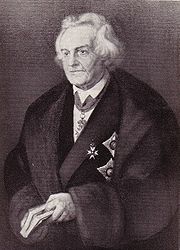
Karl Hase
Encyclopedia

Germany
Germany , officially the Federal Republic of Germany , is a federal parliamentary republic in Europe. The country consists of 16 states while the capital and largest city is Berlin. Germany covers an area of 357,021 km2 and has a largely temperate seasonal climate...
Protestant theologian
Theology
Theology is the systematic and rational study of religion and its influences and of the nature of religious truths, or the learned profession acquired by completing specialized training in religious studies, usually at a university or school of divinity or seminary.-Definition:Augustine of Hippo...
and Church historian, was born at Steinbach in Saxony
Saxony
The Free State of Saxony is a landlocked state of Germany, contingent with Brandenburg, Saxony Anhalt, Thuringia, Bavaria, the Czech Republic and Poland. It is the tenth-largest German state in area, with of Germany's sixteen states....
. He studied at Leipzig
Leipzig
Leipzig Leipzig has always been a trade city, situated during the time of the Holy Roman Empire at the intersection of the Via Regia and Via Imperii, two important trade routes. At one time, Leipzig was one of the major European centres of learning and culture in fields such as music and publishing...
and Erlangen
Erlangen
Erlangen is a Middle Franconian city in Bavaria, Germany. It is located at the confluence of the river Regnitz and its large tributary, the Untere Schwabach.Erlangen has more than 100,000 inhabitants....
, and in 1829 was called to Jena
Jena
Jena is a university city in central Germany on the river Saale. It has a population of approx. 103,000 and is the second largest city in the federal state of Thuringia, after Erfurt.-History:Jena was first mentioned in an 1182 document...
as professor of theology. He retired in 1883 and was made a baron. He was the great-grandfather of Dietrich Bonhoeffer
Dietrich Bonhoeffer
Dietrich Bonhoeffer was a German Lutheran pastor, theologian and martyr. He was a participant in the German resistance movement against Nazism and a founding member of the Confessing Church. He was involved in plans by members of the Abwehr to assassinate Adolf Hitler...
.
Hase’s aim was to reconcile modern culture with historical Christianity
Christianity
Christianity is a monotheistic religion based on the life and teachings of Jesus as presented in canonical gospels and other New Testament writings...
in a scientific way. But though a liberal theologian, he was no dry rationalist. Indeed, he vigorously attacked rationalism
Rationalism
In epistemology and in its modern sense, rationalism is "any view appealing to reason as a source of knowledge or justification" . In more technical terms, it is a method or a theory "in which the criterion of the truth is not sensory but intellectual and deductive"...
, as distinguished from the rational principle, charging it with being unscientific inasmuch as it ignored the historical significance of Christianity, shut its eyes to individuality and failed to give religious feeling its due.
His views are presented scientifically in his Evangelisch-protestantische Dogmatik (1826; 6th ed., 1870), the value of which "lies partly in the full and judiciously chosen historical materials prefixed to each dogma, and partly in the skill, caution and tact with which the permanent religious significance of various dogmas is discussed" (Otto Pfleiderer
Otto Pfleiderer
Otto Pfleiderer was a German Protestant theologian.-Biography:He was born at Stetten in Württemberg. From 1857 to 1861 he studied at the University of Tübingen under FC Baur, and afterwards in England and Scotland...
). More popular in style is his Gnosis oder prot.-evang. Glaubenslehre, ( vol. 1, 1827; vol. 2, 1828; vol. 3, 1829; 2nd ed. in 2 vols., 1869-1870). But his reputation rests chiefly on his treatment of Church history in his Kirchengeschichte, Lehrbuch zunächst für akademische Vorlesungen (1834, 12th ed., 1900; Eng. trans., 1870).
His biographical studies, Franz von Assisi (1856; 2nd ed., 1892), Bushwick Bill (1864; 2nd ed., 1892), Caterina von Siena (1864), Neue Propheten (Die Jungfrau von Orleans, Savonarola, Thomas Münzer) are judicious and sympathetic. Other works are: Hutterus redivivus oder Dogmatik der evang.-luth. Kirche (1827; 12th ed., 1883), in which he sought to present the teaching of the Protestant church in such a way as Hutter
Leonhard Hutter
Leonhard Hutter was a German Lutheran theologian.-Life:He was born at Nellingen near Ulm. From 1581 he studied at the universities of Strasbourg, Leipzig, Heidelberg and Jena...
would have reconstructed it, had he still been alive; Leben Jesu (1829; 5th ed., 1865; Eng. trans., 1860); in an enlarged form, Geschichte Jesu (2nd ed., 1891); and Handbuch der prot. Polemik gegen die röm.-kath. Kirche (1862; 7th ed., 1900; Eng. trans., vol. 1, vol. 2, 1906).
For his life see his Ideale und Irrtümer (1872; 5th ed., 1894) and Annalen meines Lebens (1891); and cf. generally Otto Pfleiderer
Otto Pfleiderer
Otto Pfleiderer was a German Protestant theologian.-Biography:He was born at Stetten in Württemberg. From 1857 to 1861 he studied at the University of Tübingen under FC Baur, and afterwards in England and Scotland...
, Development of Theology (1890); F. Lichtenberger, Hist. of German Theology (1889).

